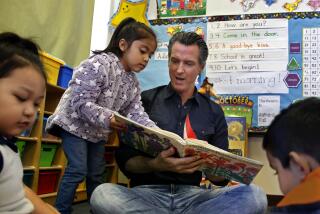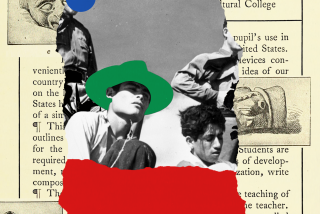New Textbooks: Out With Dull, In With Diverse
They are not like any history books you’ve ever seen.
American history does not begin with the country’s “discovery” by Christopher Columbus. The Italian explorer is not even introduced until the fifth chapter of one of the controversial history texts that received approval Thursday from a key committee of the State Board of Education for use in kindergarten through eighth grade.
The “melting pot” concept of American diversity taught to generations of students is tossed out in favor of the “salad bowl” approach. U.S. history is presented not just through the eyes of European immigrants, but through the stories of American Indians who were pushed off their land and blacks brought from Africa and enslaved.
Instead of a few oblique references to religious differences, the textbooks devote entire chapters to explaining the history, beliefs and customs of Judaism, Islam and Christianity.
The 5-0 vote Thursday came only from the board’s policy and planning committee, but approval seems almost certain when the full board votes today.
In a departure from traditional textbooks, the new series incorporates lessons in geography, archeology and language arts. The books--Houghton Mifflin social studies for kindergarten through eighth grade and an eighth-grade book published by Holt, Rinehart & Winston--are a far cry from the dull collection of dates and places common to many history texts. The committee also added an eighth-grade book published by Scott, Foresman & Co.
The new books are chockablock with colorful maps and graphs and rely on first-person narratives and excerpts from literature by a diverse group of authors. Students are encouraged to grapple with moral dilemmas and relate historical events to their own lives, giving history a decidedly personal feel.
A speech by Martin Luther King Jr. is presented early in one of the books to establish a perspective for thinking about America. Pictures give a sharp indication of the cruelty and harshness of slave life. Half of a seventh-grade world history textbook--compared to about one-third of the current text--is devoted to non-Western, non-European studies.
In-depth accounts of tribal life of various American Indian tribes are included, compared to one or two sentences describing the tribes in current texts.
The differences, while exciting educators and historians, have brought a firestorm of protests from ethnic and religious groups, who argue that their stories are misrepresented or given short shrift. Thursday’s committee meeting was free of such debate because it was not a public hearing.
After complaints from several groups, including representatives of Muslim and Jewish organizations, gay and lesbian groups, and Asian-American, Latino and black educators, the publishers made several corrections.
For example, the wording of one passage in a fifth-grade text on exploring the American West was changed to reflect that John Wesley Powell was not the first man to walk the length of the Grand Canyon, as had been stated, but the first white man.
Charlotte Crabtree, professor of education at UCLA who supervised the textbook review process, said many changes were made in the books in response to criticisms.
Several Jewish organizations complained about a sentence that read, “a few Jewish leaders took Jesus before the Roman governor,” an action that led to his crucifixion. This has been changed to, “his opponents took Jesus before the Roman governor.”
The state refused to order other changes to placate complaining groups, some of which wanted to add “facts” subject to historical dispute, while others wanted to ignore or minimize sensitive or embarrassing material.
Crabtree said the state did not yield to demands from some black individuals and organizations that the textbooks’ supposed “Eurocentric” bias be replaced with several different ethnic approaches to teaching U.S. and world history.
State curriculum officials say they expected some uproar over the books because they take on controversial topics and employ a sophisticated approach. The breadth of the protests was “unprecedented” and somewhat troubling, said Dan Chernow of the state Curriculum Commission. “It’s a totally new way of looking at (teaching) history, with an emphasis on geography, strong first-person accounts, a multicultural approach and lots of narrative,” Chernow said.
“The old books say nothing, so there isn’t much to criticize,” he said. “But that’s the problem; they’re bland and they’re boring. We wanted something that’s going to excite (children’s) interest in history.”
Banks reported from Los Angeles and Trombley from Sacramento.
More to Read
Sign up for our Book Club newsletter
Get the latest news, events and more from the Los Angeles Times Book Club, and help us get L.A. reading and talking.
You may occasionally receive promotional content from the Los Angeles Times.






